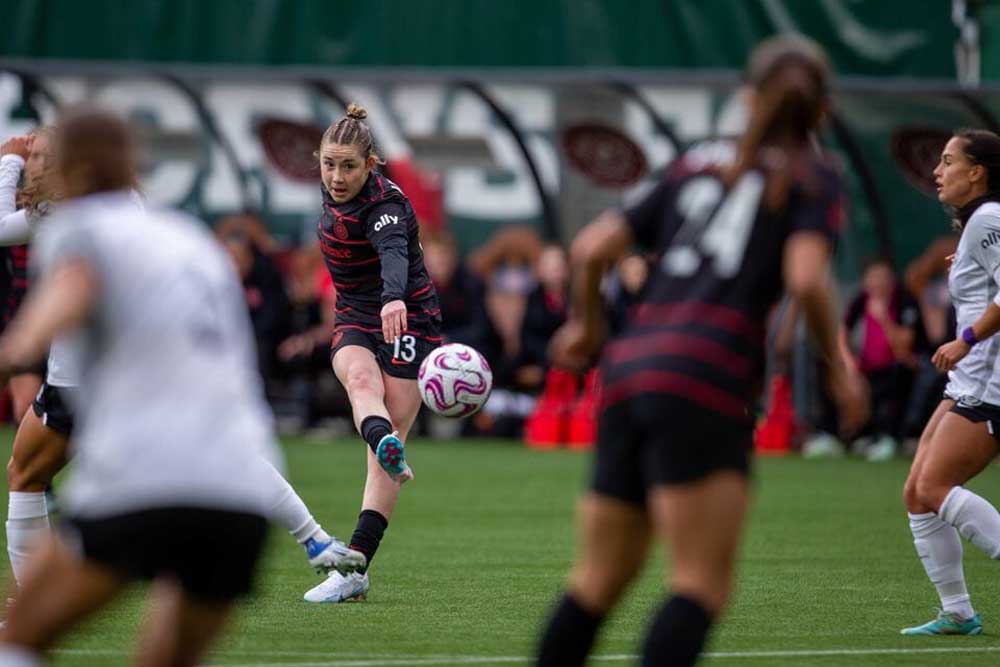Olivia Moultrie’s fight for the right to play kicked off a U.S. soccer youth movement
Published 2:27 pm Friday, February 23, 2024

- Portland Thorns midfielder Olivia Moultrie, center, fought to play professional soccer when she was only 15.
The Portland Thorns’ Olivia Moultrie wasn’t trying to save the future of women’s soccer in the U.S. as much as she was trying to jump-start her own career when she sued the NWSL for the right to play.
Nearly three years later, it looks as if she might have accomplished both.
Moultrie, 18, who next month begins her fourth NWSL season with the Thorns, is the youngest player on a U.S. national team that opened the 12-team CONCACAF W Gold Cup on Tuesday against the Dominican Republic at Dignity Health Sports Park.
It was Moultrie’s courage to successfully challenge the league’s age limit in 2021 that opened the door for rising stars such as Chloe Ricketts, Melanie Barcenas and U.S. teammate Jaedyn Shaw, none of whom could have played professionally in the U.S. under the rules Moultrie erased.
“It’s a really special thing to be the person who did that,” Moultrie said last week, days into her third training camp with the national team. “I was just fighting for something that I felt was right. There was an injustice happening. So now seeing what has come of it has been extremely cool for me.”
Age was never more than a number for the precocious Moultrie, who speaks, sounds and acts like someone twice her age. “I’ve always kind of been an old soul,” she said. “I’ve always gravitated towards older people, the adults in the room. I prefer to have conversations like that.”
As a child growing up in Santa Clarita, California, she played like someone twice her age as well. She was introduced to the game at 4 and began intense, soccer-specific training three years later, proving such a prodigy she was soon playing with boys’ teams in the U.S. Development Academy system — the first girl to do so — and on youth national teams with girls who were two and three years older. She made frequent trips to Europe to train with giant clubs such as Bayern Munich, Lyon and Paris Saint-Germain.
At age 11 she became the youngest girl to accept a college scholarship when she committed to North Carolina. At age 13 she became the youngest girl to publicly give up a college scholarship when she signed with the Wasserman Media Group, U.S. soccer’s most powerful agency, then accepted a multiyear endorsement deal with Nike. She also accepted an offer to train with the NWSL’s Portland Thorns, moving with her parents and two younger sisters to Oregon.
So when the league told her she’d have to wait until her 18th birthday to play for the team, her first question was why?
“If you’re good enough, you’re old enough,” she said. “That’s just the precedent that I’ve lived by.
“You look over at Europe and there’s no age limit for men or women. Just because I lived in the U.S. and was a female, that’s literally the only reason I wasn’t able to do what I wanted to do.”
In the spring of 2021 she filed an antitrust case alleging that the league, as the “only acquirer of talent in the market,” violated antitrust laws with its age limit. The court needed less than three weeks to rule in her favor and the league conceded defeat by declining to appeal, clearing the way for the then 15-year-old Moultrie, a midfielder, to make her NWSL debut six weeks later.
Six weeks after that, she scored her first goal against the Houston Dash in the International Champions Cup.
But Moultrie wasn’t the only one who benefited. After the 2022 NWSL season, new commissioner Jessica Berman broke with her predecessor and adopted a mechanism for signing players under 18, clearing the way for Ricketts and Barcenas, both 15, to make their league debuts last year.
“The NWSL is committed to being the best league in the world and developing young talent is central to that mission,” a league spokesperson said last week in a statement. “And we also recognize that some of the best players in the world are teenagers. For 2024 we have doubled the number of under-18 players each club can sign, and we will continue to evaluate our roster rules and entry mechanisms, as well as youth development, as we create the most effective pathways for player development.”
For a national team program that must get younger under interim coach Twila Kilgore, an NWSL full of teenagers will be a welcome change. Angel City will head into this season with a league-high three teenagers, including 16-year-old Korean American Casey Phair, while more than half of NWSL’s 14 teams will have at least one teen.
Yet it’s likely none of that happens without Moultrie having the courage and confidence to take her case to court. Still, she pushes back on the idea that she ignited a revolution because that’s not what she was aiming to do. For Moultrie, it was simply about clearing a way for her own future; if the path was wide enough for others to follow, so much the better.
“I want to be the best player in the world someday,” said Moultrie, who has appeared in 35 NWSL games (19 starts) over the last two seasons, scoring five times and collecting seven assists. “I obviously want to represent our national team as much as I possibly can. And I knew the best way forward was to become a pro. Seeing there was something in the way, it was just like, ‘All right, I’m just going to have to get past this because I’m not willing to wait.’ I’m going to do whatever I have to do.
“We are all in it for evolving women’s soccer and making it better.”






